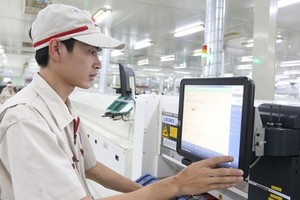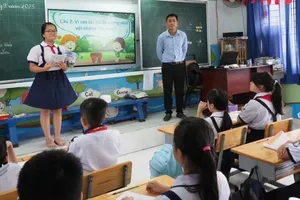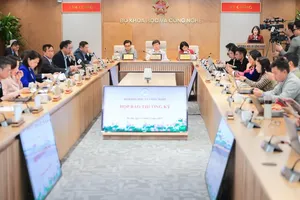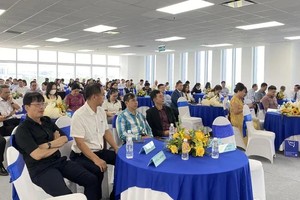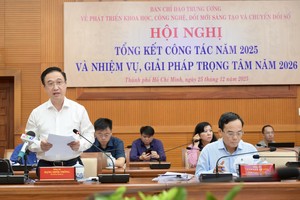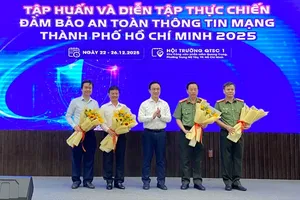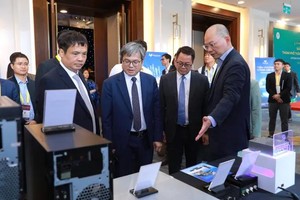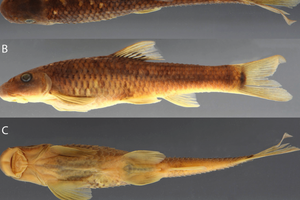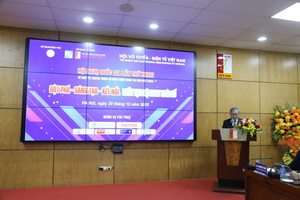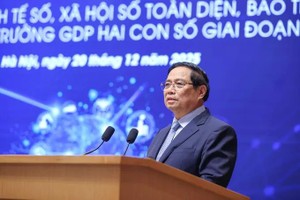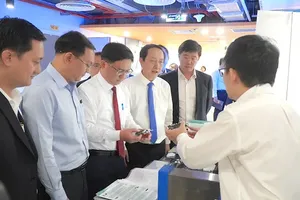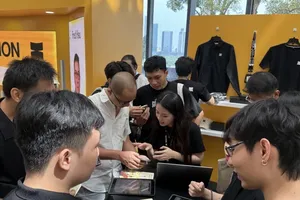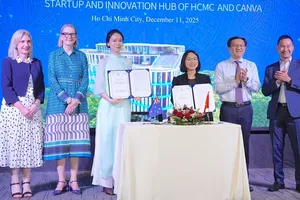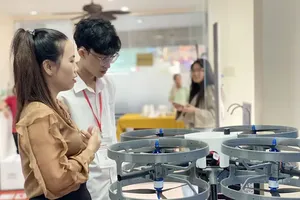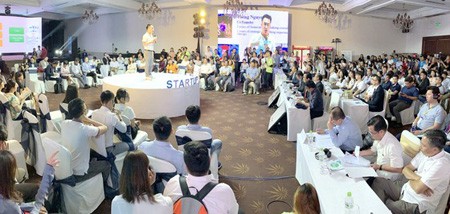
Statistics from HCMC Department of Science & Technology reveal that 3,142 enterprises in HCMC have completed the training about performance management tools and innovative tools; 759 companies have been consulted on how to boost their product quality and administrate intellectual property; 81 research projects on technology and product upgrading have been supported; and 15 projects have received help from the investment stimulus program.
These are parts of the mission to promote innovative activities in HCMC, especially related to key products of the city. This is expected to increase the proportion of Total Factor Productivity (TFP) in the Gross Regional Domestic Product (GRDP) to over 40 percent each year.
According to Deputy Director of HCMC Department of Science & Technology Nguyen Khac Thanh, the municipal authorities recently have released several practical policies to encourage innovative startup.
Decision No.4181 by HCMC People’s Committee has made way for the establishment of Saigon Innovation Hub (SIHUB) – the first state model to aid startup communities in Vietnam by linking resources in the society. From 2016 to 2019, this organization offered support for 2,230 startup projects from product perfecting to business model identifying and market connecting.
Director of SIHUB Huynh Kim Tuoc shared that after effective startup connection programs, SIHUB is now actively participating in other startup schemes like Vietnam – Finland Innovative Partnership Program (IPP), Startup Accelerator Vietnam Silicon Valley Program to gain valuable experience and seek collaboration projects with developed nations in the near future.
Noticeably, SHTP Incubation Center (SHTP-IC) successfully supports more than 40 startup projects, all of which possess intellectual property while 13 of which have received their scientific-technological business certificate. SHTP-IC is now helping SHTP Organization Board to create a network to link Vietnamese innovative startups in the US to expand the market there.
HCMC has also formed 5 innovative startup spaces and connect 24 incubation centers in the city, while creating 4 management boards for innovative startup ecosystems in the four key fields of information technology, mechanics, food processing, and plastics – rubber – chemicals.
As a result, nearly 650 startup enterprises were successful in attracting capital, especially venture one, and commercializing their own products after incubation time. The amount of money poured into Vietnamese startups lately has reached US$900 million. Out of around 3,800 startup businesses in the country in 2019, nearly 50 percent was from HCMC.
In addition, HCMC actively cooperates with other nations to increase the quality of startup activities. Particularly, it has partnered with New Zealand Consulate General to organize training sessions about ecosystem designing for startup companies; collaborated with Israel Innovation Authority (IIA) in the period from 2018-2021 to prepare policies to boost innovative startup activities; worked with the World Federation of Overseas Korean Traders Association (World-OKTA) and Busan United Management of Technology Centre (BUH) to launch the program ‘Technology Transfer between Vietnam – Korea’.
Deputy Director Nguyen Khac Thanh commented that thanks to the impressive results of current innovative startup ecosystems in HCMC (connecting over 40 startup supporting organizations, establishing data sharing platforms among 134 research centers, 626 professionals, and 275 scientific-technological centers), there have been obvious changes in the awareness about the role of not only science-technology but also innovation among citizens.
According to the Global Innovation Index (GII) in 2019, Vietnam stood at 42/129 nations and economies, an increase of 17 positions compared to 2016. It also occupied the third in ASEAN as well as the leader among lower middle-income countries.
Director of HCMC Department of Science & Technology Nguyen Viet Dung stated that it is the proper supporting policies and international collaboration that boost innovative startup activities in HCMC to the highest level.
The 2019 HCMC Innovation, Startup and Entrepreneurship Week (WHISE 2019), co-held by HCMC People’s Committee and Finnish Embassy in Vietnam, attracted over 150 domestic and international startups, offering a chance to introduce successful startup models to the public and to link potential resources.
Simultaneously, contests for startups like ‘IoT Solution for a Smart City’, ‘Innovative Startup in Hi-tech Agriculture’, ‘Creative Idea Contest’, or ‘Startup Wheel’ were organized to stress the importance of innovation among the community further.
With various activities to effectively carry out the project ‘Supporting the National Innovative Startup Ecosystem until 2025’ by the Prime Minister, the city has become the pioneer in the whole country regarding breakthrough policies and diverse activities to promote innovative startup. Therefore, the city’s innovative startup ecosystem is gradually accepted in the regional and global network.
The project ‘Helping to Develop Innovative Startup Ecosystems in HCMC from 2021-2025’ focuses on the following aims: improving proper infrastructure and services to support innovative startup ecosystems; upgrading capacity of members in these ecosystems; establishing innovative startup ecosystems for key industries in HCMC; aiding businesses to commercialize their research results; helping small- and medium-scaled enterprises to increase their performance, quality, and creativity; encouraging innovation activities in the public sector; and boosting international cooperation as well as propaganda regarding innovative startup activities.
The final draft of this project, to be submitted in the second quarter of 2020, requires the partnership between the Government, businesses, educational institutes, and supporting organizations to become fruitful.



